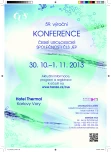Is it appropriate to administer antibiotic prophylaxis to infants with severe hydronephrosis before pyeloplasty?
Authors:
Oldřich Šmakal 1; Jan Šarapatka 1; Hana Flögelová 2; Lenka Bakaj-Zbrožková 3
Authors‘ workplace:
Urologická klinika LF UP a FN, Olomouc
1; Dětská klinika LF UP a FN, Olomouc
2; Radiologická klinika LF UP a FN, Olomouc
3
Published in:
Ces Urol 2013; 17(3): 193-198
Category:
Original article
Overview
Aim:
The aim of this study was to assess the development of acute pyelonephritis (APN) in infants with hydronephrosis, detected using ultrasonography (USG), and severe ureteropelvic junction obstruction requiring pyeloplasty. Based on the results, we evaluated the necessity for antibiotic prophylaxis until the time of surgery.
Methods:
A prospective study was performed to assess the presence of APN prior to pyeloplasty in infants with severe dilatation of the renal pelvicalyceal system (PCS). The infants underwent standard USG and MAG3 scintigraphy examinations. In those with APN, a voiding cystourethrogram was performed. During follow-up, none of the infants received primary antibiotic prophylaxis; none of the male infants were circumcised. The analysis included USG and radionuclide parameters, age and gender.
Results:
A total of 97 infants underwent surgery. APN was found in 5 boys (5.2%) with a mean age of 1.4 months. Infants with a history of urinary tract infection had a renal pelvic diameter of 11–22 mm, parenchymal thickness of 2–7 mm and relative kidney function of 40–54%. There was no statistically significant association between APN and age, gender and USG or radio-nuclide parameters. Substantive significance of APN was found in boys less than 3 months of age compared with girls of the same age and infants older than 3 months.
Conclusion:
The results suggest that routine administration of antibiotic prophylaxis is not necessary in infants during follow-up for severe dilatation of the PCS. Prophylaxis should be individually considered in boys less than 3 months of age who most frequently developed APN.
Key words:
acute pyelonephritis, antibiotic prophylaxis, hydronephrosis, pyeloplasty.
Sources
1. Woodward M, Frank D. Postnatal management of antenatal hydronephrosis. BJU Int 2002; 89(2): 149–156. Review.
2. Ammenti A, Cataldi L, Chimenz R, Fanos V, La Manna A, Marra G, Materassi M, Pecile P, Pennesi M, Pisanello L, Sica F, Toffolo A, Montini G. Italian Society of Pediatric Nephrology. Febrile urinary tract infections in young children: recommendations for the diagnosis, treatment and follow-up. Acta Paediatr 2012; 101(5): 451–457.
3. Lee JH, Choi HS, Kim JK, Won HS, Kim KS, Moon DH, Cho KS, Park YS. Nonrefluxing neonatal hydronephrosis and the risk of urinary tract infection. J Urol 2008; 179(4): 1524–1528.
4. Mamì C, Paolata A, Palmara A, Marrone T, Berte LF, Marseglia L, Arena F, Manganaro R. Outcome and management of isolated moderate renal pelvis dilatation detected at postnatal screening. Pediatr Nephrol 2009; 24(10): 2005–2008.
5. Islek A, Güven AG, Koyun M, Akman S, Alimoglu E. Probability of urinary tract infection in infants with ureteropelvic junction obstruction: is antibacterial prophylaxis really needed? Pediatr Nephrol 2011; 26(10): 1837–1841.
6. Song SH, Lee SB, Park YS, Kim KS. Is antibiotic prophylaxis necessary in infants with obstructive hydronephrosis? J Urol 2007; 177(3): 1098–1101.
7. Roth CC, Hubanks JM, Bright BC, Heinlen JE, Donovan BO, Kropp BP, Frimberger D. Occurrence of urinary tract infection in children with significant upper urinary tract obstruction. Urology 2009; 73(1): 74–78.
8. Mamì C, Palmara A, Paolata A, Marrone T, Marseglia L, Bertè LF, Arena F. Outcome and management of isolated severe renal pelvis dilatation detected at postnatal screening. Pediatr Nephrol 2010; 25(10): 2093–2097.
9. Shortliffe LM, McCue JD. Urinary tract infection at the age extremes: pediatrics and geriatrics. Am J Med 2002; 113(Suppl 1A): 55S–66S.
10. Mattoo TK. Are prophylactic antibiotics indicated after a urinary tract infection? Curr Opin Pediatr 2009; 21(2): 203–206. Review.
Labels
Paediatric urologist Nephrology UrologyArticle was published in
Czech Urology

2013 Issue 3
-
All articles in this issue
- New therapeutic modalities for castrate resistant prostate cancer at the beginning of 2013
- Modern radiotherapy of localized prostate cancer
- Management of renal injury in the Department of Urology at the University Hospital in Pilsen
- Dose escalation to the intraprostatic lesion – the results of acute and early late toxicity
- ROLE OF Biphasic 3 T MRI angiography in planning for kidney tumor surgery
- Is it appropriate to administer antibiotic prophylaxis to infants with severe hydronephrosis before pyeloplasty?
- Results from small renal mass biopsies in the Department of Urology University Hospital Ostrava
- Expression of BCL-2 and BAX-1 genes in the tissue of Ta T1 urothelial carcinoma and their prognostic value
- Czech Urology
- Journal archive
- Current issue
- About the journal
Most read in this issue
- Is it appropriate to administer antibiotic prophylaxis to infants with severe hydronephrosis before pyeloplasty?
- Modern radiotherapy of localized prostate cancer
- Management of renal injury in the Department of Urology at the University Hospital in Pilsen
- Results from small renal mass biopsies in the Department of Urology University Hospital Ostrava
